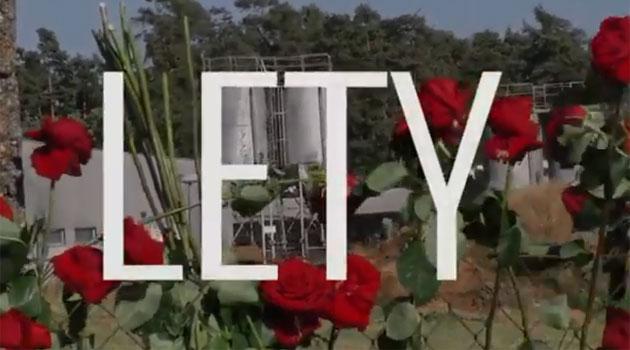Documentary film LETY to screen in Czech capital on the occasion of International Holocaust Remembrance Day

On Monday, 27 January at 18:00 the documentary film “LETY” will be screened at BIO OKO in Prague, followed by a discussion among invited guests on the broader context of the Holocaust of the Roma in Bohemia. 27 January was declared International Holocaust Remembrance Day in 2005 by the United Nations to commemorate the millions of victims of the systematic murder and persecution by the Nazi regime of the Third Reich.
“We consider it very important that facts about the Holocaust and its Romani victims become better known by the public, because today we are witnessing a situation in which this information is being called into question. We have intentionally chosen to follow the screening of the documentary with a discussion – this film corrects the record with respect to some of the speculation that has arisen about the scandal of the Lety camp and reveals a new context in which to view it, while the debate should offer a broader reflection on how the subject of genocide here is dealt with in the public space,” film producer Renata Berkyová said.
During the Second World War, two camps were created on the territory of the then-Protectorate of Bohemia and Moravia, one at Lety u Písku and one at Hodonín u Kunštátu, which were tasked with concentrating “cikáni, cikánský half-breeds and people living in the cikánský way” so they could be forcibly transported to the death camp at Auschwitz or to other concentration camps. The camp at Lety, according to historians, saw approximately 1 300 Romani children, men and women pass through it between August 1942 and May 1943, at least 327 of whom died there as a consequence of the catastrophic conditions provided for their food and hygiene.
More than 500 people from the Lety camp were then forcibly transported to Auschwitz. After the war, about 600 Romani people returned to Bohemia from various concentration camps.
According to experts, the Nazis murdered 90 % of the Bohemian and Moravian Roma. On the location of the former camp at Lety an industrial-capacity pig farm was built at Lety during communist tule in the 1970s.
Despite decades of protests by activists, by those whose relatives had been imprisoned there, and by some of the survivors themselves, the pig farm remained in operation until 2017. As of 1 January 2018 the grounds of the former camp and the now-defunct farm were taken over by the Museum of Romani Culture for administration.
The documentary film about this site associated with the Holocaust of the Roma was put together by a team from the ROMEA organization beginning in June 2018. Reportage footage from the ROMEA TV archive and that of public broadcaster Czech Television, augmented by more recent footage capturing the events of the last two years, is accompanied by testimonies from survivors and interviews with those involved in the post-1989 attempts to remove the farm from the former concentration camp site.
A component of the work on the documentary also involved investigative research into previously obscure facts that influenced how the buyout of the farm eventually transpired. The Romani filmmakers from the ROMEA, o.p.s. organization and the Internet television channel ROMEA TV – Renata Berkyová, František Bikár and Viola Tokárová – have captured the attempts of many stakeholders to remove the pig farm from the site of the former concentration camp and the ongoing debate about the history of the former so-called “Zigeunerlager“.
Guests for the discussion
Jana Horváthová – director of the Museum of Romani Culture (MRC) in Brno, a Romani historian who has been significantly influenced by the established Czech historian the late Ctibor Nečas. During the 1990s she worked with the United States Holocaust Memorial Museum on accumulating audiovisual recordings of Romani eyewitnesses and survivors of the Holocaust; the MRC has taken over the administration of the grounds of the former camp and former farm at Lety and is currently implementing an architectural competition to build a new memorial to the Romani victims of the Holocaust there.
Čeněk Růžička – chair of the Committee for the Redress of the Roma Holocaust (Výbor pro odškodnění romského holokaustu – VPORH), both of whose parents survived the horrors of the Nazi concentration camps. Mr Růžička is a longtime fighter for a dignified remembrance site to be built at Lety on the location of the former concentration camp where Romani people were imprisoned ahead of being transported to the death camp at Auschwitz and where, ever since the 1970s, an industrial capacity pig farm stood until recently.
Helena Sadílková – head of the Romani Studies Seminar at Charles University’s Faculty of Arts. She focuses on the postwar history of Romani people on the territory of the former Czechoslovakia. In addition to her other activities she is a member of the Committee for the Prague Forum for Romani Histories at the Academy of Sciences of the Czech Republic’s Institute for Contemporary History.
Čeněk Pýcha – an historian who works for the Institute for the Study of Totalitarian Regimes in its Department of Education. He deals with memory studies and histories in public spaces.
The evening is being organized by ROMEA in association with the Prague Forum for Romani Histories at the Academy of Sciences of the Czech Republic’s Institute for Contemporary History. A trailer for the documentary is here.
